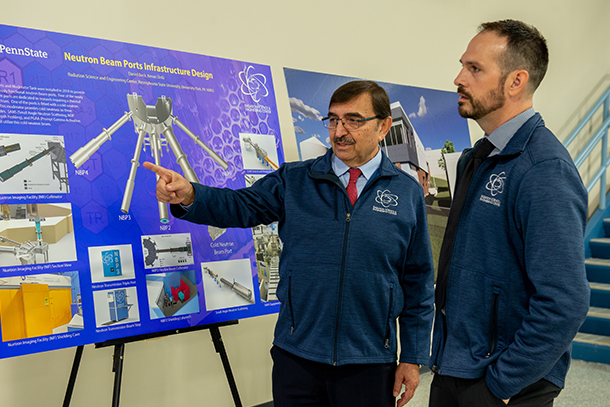
Professor Kenan Ünlü, director of the Radiation Science Engineering Center (RSEC), and Dan Beck, RSEC engineering program manager, look at a poster of the neutron beam ports and simultaneous beam operations available in RSEC. Penn State nuclear resources like these are now available to partner institutions through the Nuclear Science User Facilities program.
Penn State joins DOE Nuclear Science User Facilities program
July 13, 2023
By Sarah Small
UNIVERSITY PARK, Pa. — Penn State’s Radiation Science and Engineering Center (RSEC) has joined the Nuclear Science User Facilities (NSUF) as a partner institution.
The U.S. Department of Energy Office of Nuclear Energy’s NSUF program offers nuclear energy researchers access to world-class nuclear facilities, the expertise of nuclear scientists and engineers, and other research-related assistance, according to the NSUF website. Researchers who lack access to such facilities can apply through peer-reviewed solicitations to use NSUF facilities, which will now include those found at Penn State’s RSEC.
“This is a testament to the caliber and reputation of Penn State’s research capabilities,” said Andrew Read, interim senior vice president for research at Penn State. “It offers an opportunity to share our outstanding facilities with top nuclear researchers from around the country — a key factor of our commitment as a land-grant institution.”
Tonya Peeples, interim Harold and Inge Marcus Dean in the Penn State College of Engineering, echoed these sentiments.
“Starting with the establishment of the Breazeale Reactor in 1955 and continuing to our present-day facility expansions, Penn State has a long history as a leader in nuclear facilities for the nation,” she said. “By joining the NSUF program, we are leveraging that excellence to enable researchers to achieve unprecedented advancements in the field.”
Interested researchers can apply through one of two tracks. The first is the consolidated innovative nuclear research funding opportunity and announcement, intended for researchers looking to use multiple NSUF approaches, such as irradiation, post-irradiation examination and beamline capabilities over extended periods. The second is the rapid turnaround experiment call for proposals, intended for researchers who aim to perform studies of limited scope within nine months of receiving the award.
"The NSUF is a distributed user facility for the DOE Office of Nuclear Energy that partners with institutions across the U.S. to bring in unique capabilities to support the research and development objectives of the Department of Energy Office of Nuclear Energy,” said Brenden Heidrich, NSUF director. “The Penn State Radiation Science and Engineering Center has a variety of capabilities that will be a great addition to the NSUF, particularly the new neutron beam laboratory."
Penn State’s RSEC facilities include the Penn State Breazeale Reactor; gamma irradiation facilities including in-pool irradiator and dry irradiator; Neutron Beam Laboratory; Hot Cells Facility; Radionuclear Applications Laboratory with neutron activation analysis and a Compton suppression system; Radiochemistry Research and Teaching Laboratories; Nuclear Security Education Laboratory; Subcritical Graphite Reactor Facility; and various radiation detection and measurement laboratories.
According to Kenan Ünlü, director of RSEC and professor of nuclear engineering at Penn State, the RSEC facilities have had several upgrades since its founding. These additions include a significant redesign and installation of five new beam ports, completed in 2018, and a new neutron beam hall, added in 2022 to accommodate state-of-the-art neutron beam techniques.
“Nuclear applications are incredibly diverse and relevant in numerous fields, and research at RSEC reflects this diversity,” Ünlü said. “Our neutron imaging capabilities are some of the best in the nation, and we’ve been able to use them for some unique applications. For example, for neutron imaging, we recently have been able to investigate the Amelia Earhart disappearance, visualize the radiography and tomography for microplastics distribution in environmental samples and are working with a pharmaceutical company to image how much residual medicine stays in syringes.”
Ünlü said becoming a partner of the NSUF program will expand the scope and impact of Penn State’s contributions to the field of nuclear science and engineering even more.
“The NSUF program gives us a great opportunity to serve not just Penn State and Penn State faculty but also those from other universities, national laboratories and other research entities,” he said. “We are one of the premier nuclear science facilities in the nation, and this opportunity will increase our exposure to all nuclear entities in the United States and beyond.”



